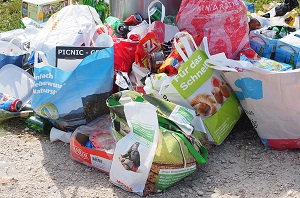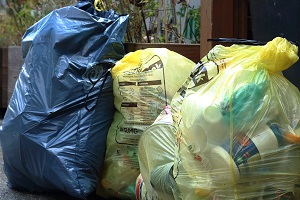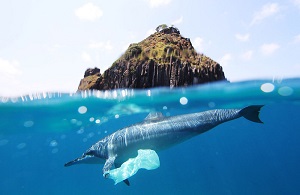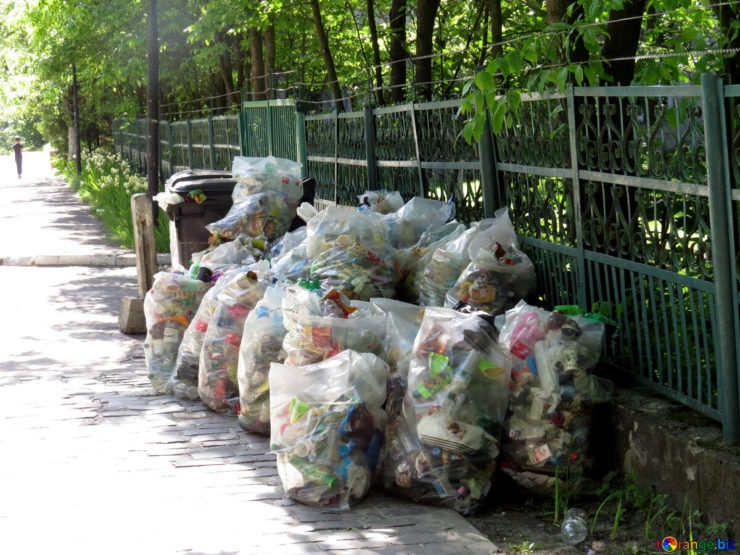
And this also meant we’ve seen an increase in recycling bags getting used every year.
It might help keep your recycling bin a little bit cleaner or from blowing away in the wind, but are they doing more harm than good?
If you’re not sure, then you’re in luck, I have all the answers for you. Keep reading to find out precisely what recycling bags are doing to the planet.
Sound good?
Great, let’s get started with:
Contents
Are Recycling Bags Recyclable?
Unfortunately, they are not recyclable bags, which is pretty strange when you consider what they’re used for.
But here’s the thing:

And the reason for that is, recycling centers can’t actually process the recycle bags.
All this means, the chances of your recycling bag ever making it to the refuge is very unlikely.
Recycling centers see it this way; by using the blue plastic bags for your recycling, you inhibit the workers from observing if there are any non-recyclables inside.
In essence, they can’t see if any contaminants are making it through and damaging the rest of the recyclables.
If you’re lucky, the workers might open up the bag to see what’s in there, but in most cases, they end up at the landfill or the incinerator.
The other reason is due to the machines; they can’t process the recycle bag, which usually results in the recycling bag getting wrapped around the equipment.
This means devices have to be turned off, cleaned and reset, or all the garbage bags will damage the machine, wasting time and tax dollars.
So, just to clarify, no, you cannot recycle any type of recycling bag, no matter which center you send it to.
You might be thinking, “I thought you could recycle plastic bags?” and your right, you can, but this is usually done under different circumstances.
If you want to find out how to recycle plastic bags, I have a great article here for you.
Are Recycling Bags Biodegradable?
No, as a general rule of thumb, a recycling bag is not biodegradable, which, again when you think about it, is a real shame.
I mentioned earlier that many of the bags that we fill with our recycling with, very rarely make it to the recycling center.
This means your recycled bag ends up at the landfill, so why is this such a bag thing?
Well, one it’s a waste of recyclable resources, but the other reason is, the blue recycling bag isn’t biodegradable. This means chances are it will never biodegrade and just add to the ever-mounting pile of trash. This is bad for a few reasons:
For one, we already have a severe problem with plastic trash ending up in natural environments.
When this happens, it can often result in animals dying, especially when you think about aquatic animals. The problem is they can mistake plastic bags for food.

And if you that’s not enough for you to understand the damage recycling/garbage bags are doing to the planet, then hopefully this will.
Humans are now consuming the pollution created from plastic products. Tiny pieces of microplastics are being found in the fish and vegetables we eat. And all this because of irresponsible trash recycling. So should they be biodegradable?
I’ve written an article about biodegradable plastic bags, and although I’m not in favor of them, it would still be better than a none biodegradable/recyclable bag.
The best option is not to use one at all; most states will provide you with a recycling bin.
Are Recycling Bags Compostable?
Again, I’m sorry to break the bad news, but recycling bags are not compostable. And if I’m honest, I don’t think they ever will be, although I do wish they would be. Compostable bags tend to be very weak compared with recycling trash bags.
The other thing with compostable bags is, they tend to start breaking down when exposed to sunlight and moisture, which recycling bags usually are.
By the time the recycling men made it to your house the bag would probably be too weak for them to pick up.
It really is a shame, compostable bags really do have the lowest impact on the environment compared to biodegradable trash bags. They work great as kitchen trash bags holding a wide variety of products, including food waste, paper waste, and much more.
So if kitchen bags can hold all those products and leave little trace they ever existed, then why can’t they hold recyclables?
In the end, even if they did switch to compostable recycling bags, it wouldn’t really work out anyway. Compostable bags cannot be recycled, which in the end means all of your recyclables won’s make it to the recycling services.
And the cycle continues of your waste products ending up in the garbage dump.
Why Are Recycling Bags Blue?

Which when you think about it is a pretty good reason; you don’t want all your food waste and kitchen trash bags ending up at the recycling center.
Chicago started using the blue bag system in 1995, which they felt would help push people to recycle more often. The thing is, it didn’t work for a couple of reasons. To start with, recycling bags were very often more expensive than regular garbage bags.
This left people pretty unhappy they had to pay such a high price to use a service provided by the government.
The other issue was the city couldn’t recycle them, which resulted in extra work opening and separating the blue plastic bags.
And when a plastic trash bag or two slipped through, they had to turn off all the machines to stop the contaminant reaching the recyclables.
Or, in some cases, taken the machine apart to fix the blockage. In 2008 the Chicago Suntime said the government was going to give up on the blue bag services.
Later on, in 2011, they switched to the blue crates, which has been a massive success. More people are recycling than ever, but unfortunately, recycling workers are begging people not to store the recyclable products in any type of garbage bag.
And I think it’s time we start listening to the sanitation workers, leave the trash in the bags, and recyclable in the crates. Let’s help them make the services run smoothly.
How To Order Recycling Bags
It all depends on what type of recycling bag you need for the job; different bags can be used to recycle different things.
Some counties in the UK will offer free recycling bags delivered to your door. All you have to do is make a simple selection of what recycling bag you need:
- Dry mixed recycling (clear bags)
- Garden waste (white sacks)
- Food waste (small caddy liners)
- Textiles (large purple bags)
In fact, Hamburg, Germany, recently banned the sale of the single-use product completely to try and stop the trash pandemic.
Well, Nespresso has its recycling project where you deposit your old and used pods instead of chucking them in the trash. Which is pretty neat; they deliver the bags to your door, where you can store them up, ready to take them to the drop of center.
If you can’t make it there, you have some other options you can check out on the Nespresso website.
But, like always, I recommended you go for biodegradable K-cups, so much better for the environment.
Anyway, I digress, My point is there are plenty of places you can order recycling bags it just takes a quick search online.
Summary
So recycling bags, good or bad for the environment?
We have to say it’s bad, and although there are so many people using them, does that mean you have to? No, I didn’t think so. The thing is, what’s the point if there are just going to end up in the landfill.
If the workers are begging people to stop using them, then maybe it’s time to listen, they’re in the business, and they know what needs to be fixed.
I hope you enjoyed this installment, comment below if you have any questions and I’ll get back to you as soon as I can. If you’re still looking to learn more, why not check out this article on how to recycle Christmas lights?


